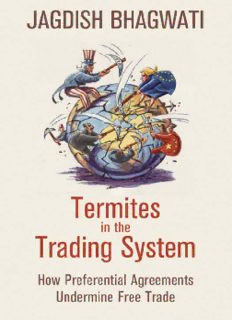
Termites in the Trading System: How Preferential Agreements Undermine Free Trade PDF
Preview Termites in the Trading System: How Preferential Agreements Undermine Free Trade
Termites in the Trading System TheCouncilon Foreign Relations is an independent, nonpartisan membershiporganization,thinktank,andpublisherdedicatedtobeinga resourcefor its members, governmentofficials, business executives, journalists,educatorsandstudents,civicandreligiousleaders,andother interested citizens inorderto helpthem better understand theworld and theforeignpolicy choices facing theUnitedStates and other countries.Foundedin1921,theCounciltakesnoinstitutionalpositions onmattersofpolicy.TheCouncilcarriesoutitsmissionbymaintaining a diverse membership; convening meetings; supportinga Studies Programthatfostersindependentresearch;publishingForeignAffairs,the preeminent journal on international affairs and U.S.foreignpolicy; sponsoring IndependentTaskForces;and providing up-to-date information and analysis about world eventsand Americanforeign policy on its website,CFR.org. THECOUNCIL TAKES NOINSTITUTIONAL POSITION ON POLICY ISSUES ANDHAS NO AFFILIATION WITH THEU.S.GOVERNMENT. ALL STATEMENTS OF FACT ANDEXPRESSIONS OF OPINION CONTAINED IN ITS PUBLICATIONS ARE THE SOLE RESPONSIBILITY OF THEAUTHOR OR AUTHORS. JAGDISH BHAGWATI Termites in the Trading System How Preferential Agreements Undermine Free Trade A Council on Foreign Relations Book 1 2008 1 OxfordUniversityPress,Inc.,publishesworksthatfurther OxfordUniversity’sobjectiveofexcellence inresearch,scholarship,andeducation. Oxford NewYork Auckland CapeTown DaresSalaam HongKong Karachi KualaLumpur Madrid Melbourne MexicoCity Nairobi NewDelhi Shanghai Taipei Toronto Withofficesin Argentina Austria Brazil Chile CzechRepublic France Greece Guatemala Hungary Italy Japan Poland Portugal Singapore SouthKorea Switzerland Thailand Turkey Ukraine Vietnam Copyright#2008byOxfordUniversityPress,Inc. PublishedbyOxfordUniversityPress,Inc. 198MadisonAvenue,NewYork,NY10016 www.oup.com OxfordisaregisteredtrademarkofOxfordUniversityPress Allrightsreserved.Nopartofthispublicationmaybereproduced, storedinaretrievalsystem,ortransmitted,inanyformorbyanymeans, electronic,mechanical,photocopying,recording,orotherwise, withoutthepriorpermissionofOxfordUniversityPress. LibraryofCongressCataloging-in-PublicationData Bhagwati,JagdishN.,1934– Termitesinthetradingsystem:howpreferentialagreements underminefreetrade/JagdishBhagwati. p.cm. Includesbibliographicalreferencesandindex. ISBN978-0-19-533165-3 1. Tariffpreferences. 2. Tradeblocs. 3. Freetrade. 4. Commercialpolicy. 5. Internationaltrade. I. Title:Preferentialagreementsunderminefreetrade. II. Title. HF1721.B432008 382'.71—dc22 2007052420 9 8 7 6 5 4 3 2 1 PrintedintheUnitedStatesofAmerica onacid-freepaper In memory of Gottfried Haberler A great international economist and multilateralist This page intentionally left blank Every additional PTA [preferential trade agreement] will become one moreobstacleto theuniversal and non-discriminatory trade liberalization thatthe world needs. PTAs havebeen more easily hijacked byspecial interest groups andarenot resultingin really good instruments....Thepresentdealsarelittle monstersthatwill be much regrettedin the future. —Ernesto Zedillo, formerpresident of Mexico In practice, bilateralism has fed off itself, intensifying the rush into preferentialdealswhile draining energy from the Doha talks. —Guy de Jonquie`res, world trade correspondent, Financial Times This page intentionally left blank Contents Preface xi chapter 1 Proliferating Preferential Trade Agreements 1 chapter 2 Why Has the Pandemic Broken Out? 15 chapter 3 Why PTAs Are a Pox on the World Trading System 49 chapter 4 What Do We Do Now? 89 Appendix 101 Glossary 113 Select Bibliography 123 Index 127
Description: